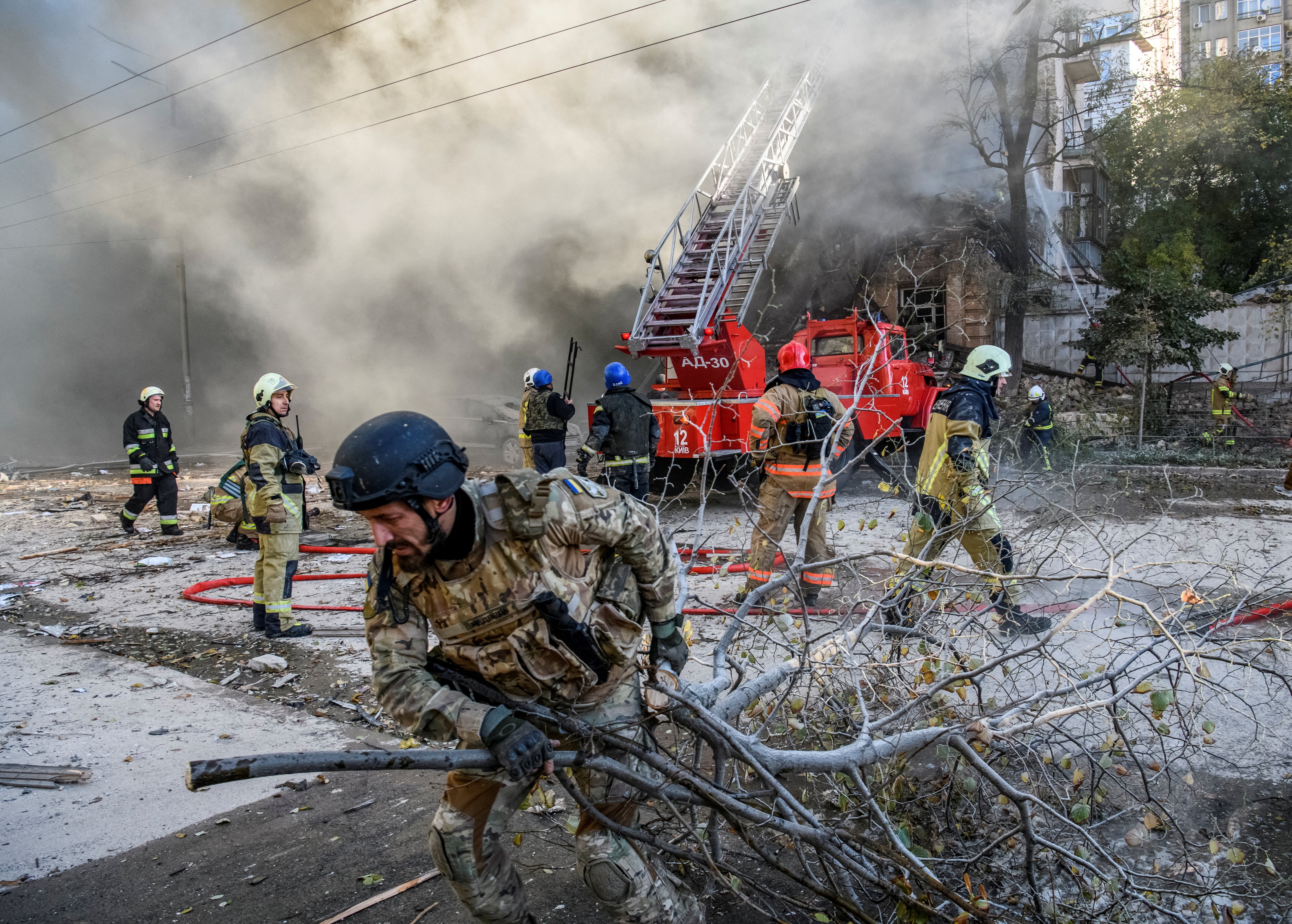Will Russia’s Iranian drones prompt Israel to arm Ukraine?
A direct and public plea for weaponry is pushing Israel’s balancing act to breaking point, writes Bel Trew


Arguably one of the biggest developments for Russia in its war on Ukraine is the deployment of powerful kamikaze drones. For the last few weeks, Russia has used drones and missiles to hit critical infrastructure in Ukraine. It has resulted in 40 per cent of energy facilities being damaged or destroyed, Ukrainian officials have told me.
That has meant that the country has had to restrict its electricity use across the country. Rolling blackouts could be potentially deadly as a bitter winter looms.
Ukraine, together with the UK, France, Germany and the US, have accused Iran of supplying the drones to the Russians in violation of the 2015 resolution. These four countries have also backed Kyiv’s call for a UN investigation into it. Iran has vehemently and repeatedly denied providing the drones, and slammed the potential UN probe.
But just last week, the White House claimed that not only are Iranian drones being deployed, but Iranian trainers and tech support workers are actually in Russian-occupied Crimea, helping launch drone attacks on Ukraine.
And so, alongside the calls for an investigation, Kyiv has reached out to Israel, Iran’s arch enemy, for support – specifically requesting Israel’s powerful Iron Dome air defence system. The argument from the Ukrainian defence officials is that not only would it help Ukraine, but “it would be good for Israel”.
“Iran is using Ukraine as a testing ground for these drones. They are trying to work out their strong and weak sides,” Yuriy Sak, an adviser to the Ukrainian defence ministry, told me this week from Kyiv. “They will perfect these drones here and one day these perfected drones will be fired at Israel.”
So far, Israel has categorically refused to supply Kyiv with the weapons and has limited its assistance to humanitarian relief and protective gear. Most recently, Israel has offered to help Ukrainians develop air attack alerts for civilians – a mechanism which would save lives, Israeli officials have said. But that is as far as its support has gone.
Israel has also not joined in international sanctions on Russia. On Wednesday, Israeli defence minister Benny Gantz said their position had not changed, and stated that “for obvious reasons” Israel did not want to enter the conflict by providing combat systems.
But the pressure is on Israel to change its tune. “It is counterproductive if they do not help us,” Sak continued, speaking to me from Kyiv. “If they want to protect themselves they should provide us with an anti-drone system.” Any attack on Ukraine could be easily replicated on Israel, he stressed.
It’s a tricky position for Israel, which has publicly condemned President Putin’s invasion of Ukraine, saying at the start of the war it was “a serious violation of international order”.
At least 15 per cent of Israel’s population is Russian-speaking, making up the largest Jewish minority according to US think tank the Wilson Centre. More than one million Russians settled in Israel in the decade that followed the collapse of the Soviet Union.
Israel also relies on its close communications with Moscow over its war-ravaged neighbour, Syria. Following the 2015 Russian intervention in the Syrian civil war, Israel set up a “deconfliction mechanism” to prevent them from clashing inadvertently during Israeli strikes against Iranian positions, weapons depots and arms transfers in the neighbouring Arab state.
Israeli media outlet Haaretz has reported that Israel is also concerned that in retaliation for providing weapons to Ukraine, Russia could respond by supplying Syria with systems which could impede their airstrikes there.
There are reportedly concerns among Israeli defence officials that their air defence systems could be used by Ukraine to down Russian planes. The fear is that the loss of Russian pilots would see the blame laid at Israel’s door.
To keep up to speed with all the latest opinions and comment sign up to our free weekly Voices Dispatches newsletter by clicking here
And so the Ukraine war and, more recently, Ukraine’s direct and public plea for weaponry is pushing Israel’s balancing act to breaking point. It’s unclear what Israel will do. There are hints this position might change as the situation becomes direr in Ukraine and the war drags on.
Citing an unnamed senior Ukrainian diplomatic official, Haaretz reported last week that Israeli prime minister Yair Lapid had promised that Israel would be able to do more for Ukraine if he remained premier after the upcoming elections next week.
Lapid may not want to promise any weapons to Ukraine ahead of the general election which will take place on 1 November, perhaps not wanting to lose the support of the Russian-speaking population. He may not want to rock the boat security-wise at such a critical time: this week’s election is the fifth vote in less than four years. Israel has been affected by a political crisis of its own.
Either way, the geopolitical repercussions of the war in Ukraine continue to ripple well past its borders and throughout the world. The Israel, Russia, Iran and Syria dilemma is just the next Gordian knot.






Join our commenting forum
Join thought-provoking conversations, follow other Independent readers and see their replies
Comments